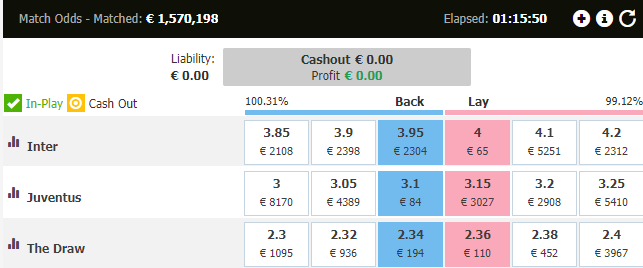
Trading the sport markets is the best way to achieve long term and sustainable profits from betting. In this article, I am going to give you a quick explanation of what is sports trading.
So what in fact, is Sports Trading?
Let’s start with a simple definition of what is sports trading. In simple words, sports trading is the combination of two bets that are placed against each other and the objective is to obtain a profit.
Imagine the way Stock trading is done. Now, sports trading is similar to that. The difference between them is that shares of the companies are bought and sold in stock trading. In Sports trading, bets are being placed in betting exchanges such as Betdaq, Smarkets, Betfair or Matchbook.
The main objective of stock traders is to buy at a low price and sell at a higher one. When it comes to sports betting, the principles here are the same. In comparison to forex trading or stock trading, the main difference is the capital outlay. When it comes to forex trading you will need ten times the capital than that in sports trading to achieve the same level of profits.
The main difference between traditional sports betting is that you do not have to pick the winner. You only try to find angles in the market and price movements that will lead you to profit.
Sports Trading explained: how does it work?
Sports Trading actually is just like other financial markets.
It is a global market where traders place bets against each other in various sport events. That can be any event like football, horse racing, baseball and others. Betting exchanges act as middlemen and they are getting a 2 – 8% cut on every winning bet depending on the exchange. The liquidity of the markets is a very important factor and the higher it is the easier will be for traders to match their bets.
Rather than trying to beat a bookmaker, in order to make a profit on sports trading you have to compete with other traders. Traditionally, bets initiated by bookmakers are always placed as back bets. Ultimately this means that a punter bets something to happen. On a betting exchange when another trader accepts that bet, they take lay bets which are the opposite: a bet that something won’t happen. The ultimate goal on sports trading is to back at a higher price than the lay price.
The main advantages of placing bets on betting exchanges are:
- No stake limits as long as the liquidity is high and there other bettors ready to match your bet.
- No fear of getting your account restricted. The exchanges are getting paid form the commission of winning bets and the do not care if you are a winner or a loser.
- In most cases, you will get higher odds than any other bookmaker. Also if you are active enough your commission will get lower and that will increase your winning margin.
- You will always have to the possibility to get out of a trade if something goes wrong.
Sports Trading Glossary: Terms You NEED to know
So that were the basics of Sports trading. Now it is time to get more familiar with the topic. Here is a glossary of essential terms that need to be known in Sports trading:
“Back bet”
Placing a bet for an outcome to happen.
“Lay bet”
Placing a bet for an outcome not to happen.
“Green-up”
Closing all open bets to lock in a guaranteed profit.
“Red-up”
Closing all open bets to lock in a guaranteed loss.
“Scratch”
Canceling one bet by placing another at opposite odds to the original one. That generates a position with now profit or loss
“Tick”
It is the differences between all the available price increments.
“Liquidity”
This is an indicator on a Betting Exchange which shows how much money has been matched at any given time.
“Weight of Money”
The amount of money waiting to be matched in the exchange (below the odds).
Sports Trading Software
Most experienced traders will say that trading software is a crucial element in sports trading. While the websites can help do a lot of things, they are not as well built or convenient as a trading software. Here are some things why one should consider using trading software:
- Introduces advanced trading ladders and charts.
- Bets display at real-time. Websites usually take some time to refresh odds.
- Convenient single click betting.
- Multiple markets with full depths.
Betting exchanges
Traditional bookmakers typically dominate the industry of betting, but in recent years betting exchanges have steadily taken control and they now serve as a viable alternative to traditional bookmakers.
When players gamble on the betting exchange, the experience changes slightly, as gamblers are not betting against the bookmaker itself. Rather than gambling against the house, people wager against other punters. This is cutting out the middleman and betting against other gamblers. Essentially, the exchange is the gambler, so betting odds change depending on the amount of people playing, as opposed to the whim of the bookmaker.
Investments
Investing within the realm of gambling is common in the 21st century. With the insatiable hunger of punters for more options and more exciting gaming experience, opportunities have arisen for some major advancement. These changes are mainly down to increasing technology and the boost to the availability of sports betting as a whole. The fact exchange betting even exists means a completely new world of sports betting entertainment awaits. Betfair is the front-runner for betting exchanges in the UK, but there are smaller competitors such as Betdaq, Smarkets and Matchbook.
Currently, there are no central bookmakers possessing a betting exchange. It gives punters a whole host of advantages, like increased odds. Since there are no profit margins, the odds can rise higher than ever before. Instead, the way betting exchanges comb their profit from their operations is through commissions on winnings. These fees are lower than taking the lower odds from a bookmaker, though, so it is nothing to run away from.
Betting Exchange Benefits
- The main benefit of the betting exchange is that the profit margin demanded by the bookmaker disappears. In most situations, the odds tend to rise higher as opposed to those offered by bookmakers due to the significant lack of any profit-driven activities. Gamblers also have the option to ‘sell’ bets they have already made. This allows an enhanced degree of choice before the match begins.
- Play the bookmaker. Betting exchanges allow gamblers to offer (LAY) betting odds. This is an alternative route to sports betting and adds a number of untapped wealth sources to any betting portfolio.
- ‘Made bets’ is the equivalent of stock trading. Take these bets and buy and sell them for a profit before the referee even blows a whistle. A great way to infuse some excitement into an otherwise tiresome betting schedule!
- More profit. Ultimately, betting with a betting exchange offers more profit than a bookmaker because of the enhanced betting options. It is no longer just about picking the right team, it is about betting in the correct way.
Although many purists still prefer their beloved bookmakers, nobody can deny the excitement offered through betting exchanges. They offer low starting costs and the chance to try something new without making a major investment or committing to anything. It is definitely a way to put the excitement back into the world of sports gambling.
Different types of Sports trading
Sports betting is a diverse format, and it is not limited to one typical example. In fact, there are many ways to do it. Different types of trades will have different odds in different markets. Let’s talk about some techniques of sports trading.
- Scalping
Scalping is a technique used to Trade small price movements to bring in multiple small profits. It has a low risk, but it also likewise, has a low reward. It is better used in fast-moving markets such as horse racing or in-play trading.
- Swinging
Swing trading is meant to bring profit from more significant price movements. It involves higher risks because it is dependent on possible and significant events (a red card or a goal for example).
Here you are placing bets with the expectation the markets to move in a specific direction. If not, then you lose. The goal is to earn several ticks from every trade and so the stop-loss is placed further away from the current price.
- Value Betting
Since you can only place back bets if you prefer, you can use the betting exchanges for your value betting purposes.
You can read more about the concept of value betting here.
- Cross Market Trading
Cross market trading is a popular approach to placing bets, especially in football events. It involves placing bets on different markets such as the correct score market and overs/unders for example.
This technique is more suitable for skilled and experienced traders. You will have to make the calculations yourself (risk, liability, potential profit) so you have to be extra careful for this to work.
Why sports trading?
Sports trading is the most solid way to achieve long term profits from betting. The majority of traders come from arbitrage or matched betting. Due to bookie limitations, they are trying to find a way to continue their gambling activities and sports trading is the best solution. Of course, sports trading requires a certain level of skill but if you master it you are a step closer to your financial independence.
You do not have to gamble trying to find a winning team or horse etc. and you don’t care who is going to win the event. Trading offers flexibility and you can end up winning, whatever a game throws at you.
As with every type of betting your profitability will also be determined by other factors such as discipline, bet tracking, money management and others.
For the reasons above I suggest that you should try to learn how sports trading works and add that technique to your betting portfolio.
I hope that you have found my article useful and informative. If so feel free to share it or leave a comment below.

